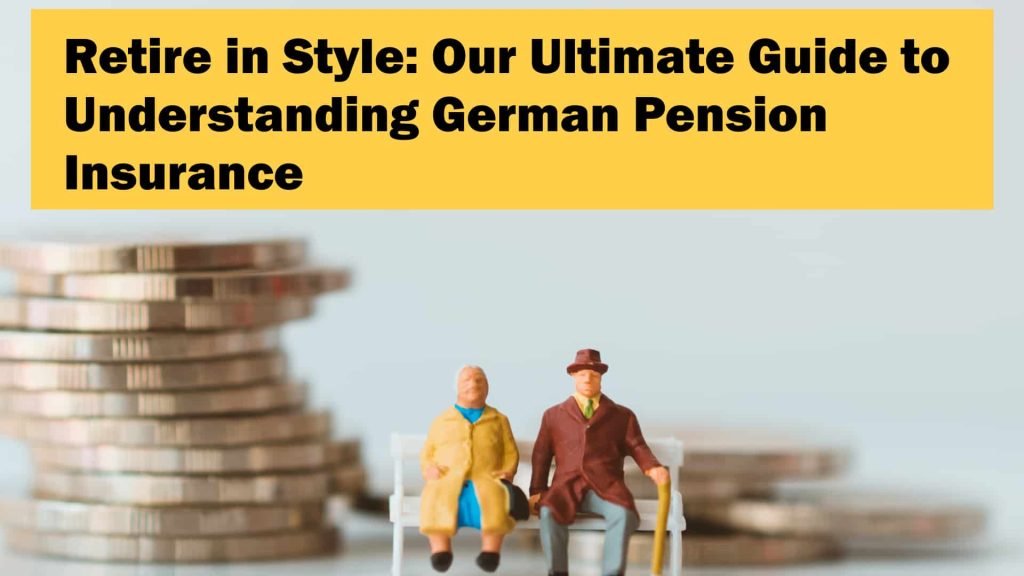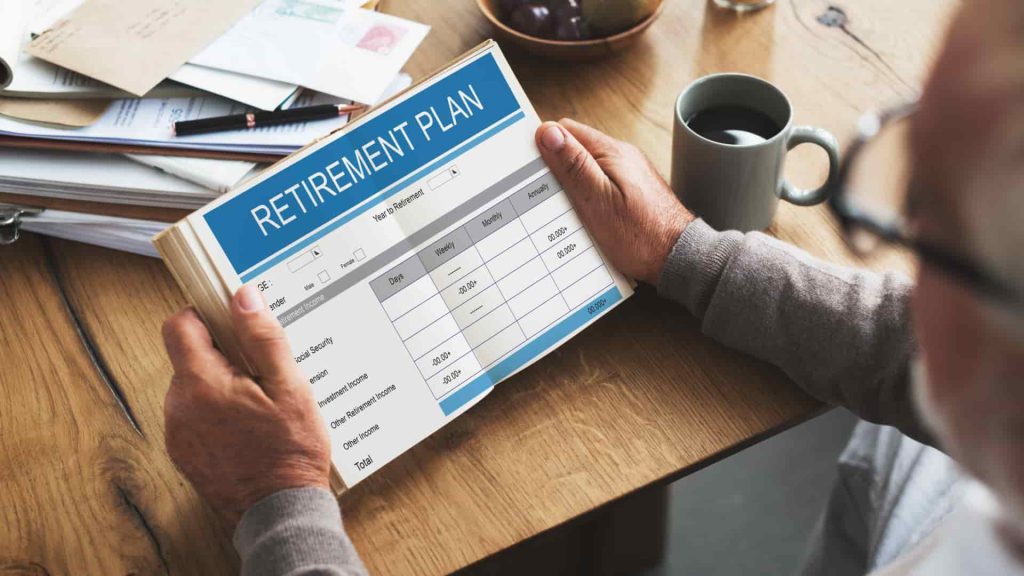
Pension Insurance in Germany, hmmm….
Now now, this is like finding a deep, hidden treasure, a result of your cumulative contribution to the German economy and society. It is essentially a tool to guide you to securing your golden years (of rest and retirement).
We completely understand if the mere mention of pensions and insurance sends you into a guaranteed snooze-fest. I mean, who even wants to plan that ahead into life, anyways?
We’ll try and break down the whole concept and workings of Deutsche Rentenversicherung or very very simply said, the German pension insurance.
Let’s begin, then, shall we?
Make sure to read: A Quick and Simple 101 Guide to Vegan Dining in Berlin

Understanding Pension Insurance in Germany
Deutsche Rentenversicherung or Pension Insurance in Germany is a fundamental pillar of the social security system in the country that enables them to provide financial assistance and security to individuals after retirement, disability or the loss of a spouse.
The primary purpose of pension insurance in Germany is to replace a portion of your pre-retirement income after you retire or if you become disabled or lose a main contributor to the family income. The primary benefit of the insurance is aimed at members of the society who cannot fully contribute to the economy on a regular basis. It covers almost all citizens of the country including employees, their family and dependents, freelancers, service providers and those who are self employed.
First established in 1957, pension insurance in Germany is a pay-as-you-go system, where current workers’ contributions fund the pensions of current retirees. It plays a crucial role in ensuring financial stability and a decent standard of living for retirees, individuals with disabilities and surviving spouses.
There are three main types of pension insurance available in Germany at the moment:
| Type of Pension | Description | Eligibility |
| Old-age pension (Altersrente) | Provides income replacement upon reaching retirement age. | Must have reached retirement age and contributed to the system for a minimum period (usually 5 years). |
| Disability pension (Erwerbsminderungsrente) | Provides financial support to individuals who are unable to work due to long-term illness or disability. | Must be under retirement age, have a minimum contribution period, and meet specific disability criteria. |
| Survivor’s pension (Hinterbliebenenrente) | Supports surviving spouses who have lost their partner. | The deceased spouse must have contributed to the system for a minimum period, and the surviving spouse must meet specific criteria (e.g., age, number of children). |

Also read: 13 Stunning Facts on the German Education System
General Eligibility Criteria to Avail the Pension Insurance in Germany
- Employment: As mentioned above, almost all individuals who work in Germany, including employees, freelancers and the self-employed are automatically enrolled into the pension insurance scheme.
- Minimum Contribution Period: To qualify for any type of pension, you must have contributed to the system for a minimum period of five years.
- Age Limit: There are specific age limits or restrictions for different kinds of pension insurance in germany. In order to qualify for the old-age pension, you need to be between 63-67 years old. For disability pension, there is no age limit, but you need to be in the same age age-bracket as above. In order to avail the survivor’s pension, the eligibility is dependent on the spouse’s contributions and the situation of the surviving spouse.

There are a few special considerations to note here:
- For individuals working temporarily in Germany, they may be exempt from contributions if they are already covered by a social security system in their home country. However, they can still choose to contribute voluntarily to secure future benefits.
- Self-employed individuals and freelancers are responsible for registering themselves with the pension insurance in Germany and paying contributions based on their income. They have the option to choose between minimum and maximum contribution levels.
We think you’ll love this: Everything You Need to Know About ‘Ruhezeit’ or the German Quiet Hours
How to Register for Pension Insurance in Germany
As a new employee in Germany, one of the crucial steps in your onboarding process is to register for the pension insurance scheme.
Although the question is ‘how do you register for pension insurance in Germany’, your employer is usually responsible for doing it on your behalf. You just have to wait it out until you get your insurance number and contribution details.
You can choose to verify your registration online by accessing your online account on the official website to confirm all your details.

Listed below are all the documents you need to keep handy when it comes to any issues regarding your pension insurance in Germany:
- Sozialversicherungsausweis: This document contains your unique insurance number and is essential for future communication with Deutsche Rentenversicherung.
- Personal details: Name, date of birth, address, and contact information.
- Employment information: Employer details, start date, and expected duration of employment.
Different employers have different means of approaching the pension insurance scheme, so you will need to take initiative and enquire about the formalities, regardless of the planned duration of your stay in Germany.
Contributions to Pension Insurance in Germany: How Does it Work?
There are few things you need to be aware of when it comes to pension insurance in Germany.
- Contribution Rate: Essentially, this is the percentage of your monthly income you are expected to contribute to the pension insurance. Currently, it is approximately 18.6% of your gross monthly income.
- Shared Responsibility: This is part of the contribution mentioned above. What this means is that the contribution is shared equally between you and your employer, meaning each pays about 9.3% of the gross income.
- Capping: In order to ensure equity, there is a cap on the income considered for contribution calculations. In 2024, this cap is €87,600 per year in West Germany and €85,200 per year in East Germany.
- Automatic Deduction: You need not worry about forgetting to pay your contribution since the process is well-automated in Germany. Your employer usually deducts your contribution portion from your gross salary before paying you your net salary. Both yours and their contributions are forwarded to the pension insurance scheme together.
- Self-Employed Individuals: For those who do not work under an employer, they are responsible for calculating and paying the full contribution amount (18.6%) by themselves.
- Voluntary Contributions: For those who haven’t met the contribution period or wish to increase their future pension benefits, they can make voluntary contributions. Here, there is no cap and you can directly make these contributions through the Deutsche Rentenversicherung platform.

Don’t forget to read: Top 8 German Television Shows and German Cinema – Your New To-Watch List
Making Up for Missed Contributions
While this is an unlikely phenomenon, certain life changes like periods of unemployment, parental leave or self-employment with no contributions may arise leading to no contributions.
There are provisions to buy back these missing contributions to increase your future pension benefits, but there are restrictions and costs involved. Visit or get in touch with the officials before proceeding.
Your recommended post for the week: The Essential Role of ‘Ordnungsamt’ in Local Neighborhoods
Pension Insurance in Germany is a Necessary Step Towards a Comfortable Future.
Securing your future with the pension insurance in Germany may seem quite daunting and sometimes even irritating (considering you are contributing a large position of your salary towards it).
But it is important to remember that it is not just about contributing; it is also a long-term investment that ensures that you don’t just survive but thrive when your work days are behind you.
You are essentially investing in your peace of mind and independence, when the hustle and bustle of work quietens down. Regardless of whether you’re navigating the early days of employment or braving self-employment or belong somewhere in between this, this scheme’s got your future all secured.




